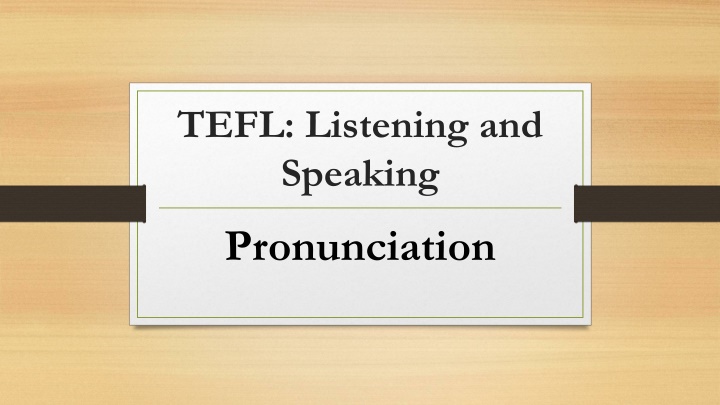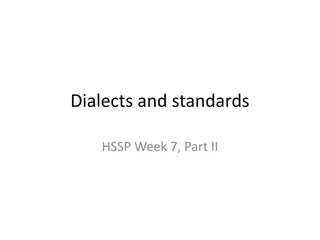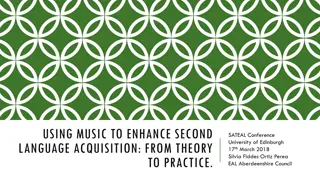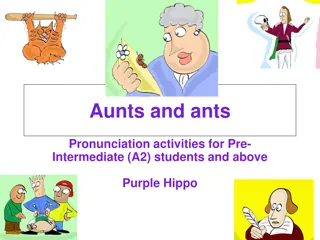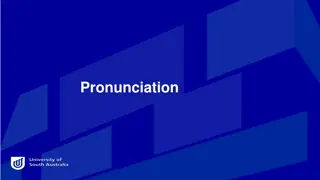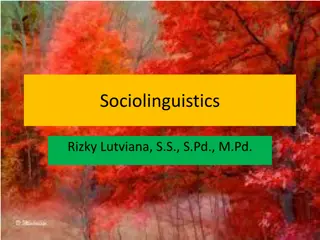Importance of Pronunciation in Language Learning
Pronunciation plays a crucial role in language learning, impacting communication and memory retention. Teachers and learners often face challenges with pronunciation, affecting long-term memory encoding. Factors influencing sound system learning and strategies to improve pronunciation skills are discussed, emphasizing the significance of addressing pronunciation errors in language courses.
Uploaded on Mar 06, 2025 | 0 Views
Download Presentation

Please find below an Image/Link to download the presentation.
The content on the website is provided AS IS for your information and personal use only. It may not be sold, licensed, or shared on other websites without obtaining consent from the author.If you encounter any issues during the download, it is possible that the publisher has removed the file from their server.
You are allowed to download the files provided on this website for personal or commercial use, subject to the condition that they are used lawfully. All files are the property of their respective owners.
The content on the website is provided AS IS for your information and personal use only. It may not be sold, licensed, or shared on other websites without obtaining consent from the author.
E N D
Presentation Transcript
TEFL: Listening and Speaking Pronunciation
Pronunciation When some teachers and learners complain about difficulties in speaking, they are often talking about pronunciation. The amount of attention given to the teaching of pronunciation in language courses varies considerably, partly as a result of the teacher s attitude to error and the learners language learning goals.
The Importance of Pronunciation Having a good pronunciation of the language can help in normal communication, particularly intelligibility. A very important mechanism involved in working memory the phonological loop. The phonological loop is the brain saying a word or phrase over and over to itself in order to keep it in working memory or to help it move into long-term memory. Ex. Repetition of phone numbers to memorize
The Importance of Pronunciation If learners do not have a stable pronunciation for a word, it cannot easily enter long-term memory because it cannot be held in the phonological loop. The size of ESL learners working memory in the second language is affected by their knowledge of patterns of pronunciation and grammar in that language. Giving attention to pronunciation is important in the course to develop a stable pronunciation, and become familiar with the patterns and rules in SL.
Factors Affecting the Learning of Another Sound System There are five factors that have been shown to have major effects on the learning of another sound system. 1. age of the learner, 2. the learner s first language, 3. the learner s current stage of proficiency development, 4. the experience and attitudes of the learner, 5. the conditions for teaching and learning.
Factors Affecting the Learning of Another Sound System Three reasons why the students might have difficulty to copy new sounds. 1. They overlook some feature. 2. The learners sound bad to themselves when they copy well. 3. The learners become anxious about making the sounds.
Fitting Pronunciation into a Course Regularly setting aside a special time, Setting goals and activities for individual work. Dealing with pronunciation errors as they occur, Organizing meaning-focused speaking activities which can affect pronunciation.
Learners can practise intonation in the following ways. Copying the teacher. Making gestures to go with changes in intonation. Saying the last word of a sentence by itself with the correct intonation, rising or falling. Showing drawings of intonation patterns.
The ways to correct the pronunciation mistakes Repeating the word correctly several times with ordinary stress, Repeating the word correctly giving extra stress and length to the part where the learner make the mistake. Comparing the mistake and the correct form: Not lice but rice. Writing the word on the board correctly and underlining the part where the learner made a mistake. Saying No and letting the learner find the mistake without help.
